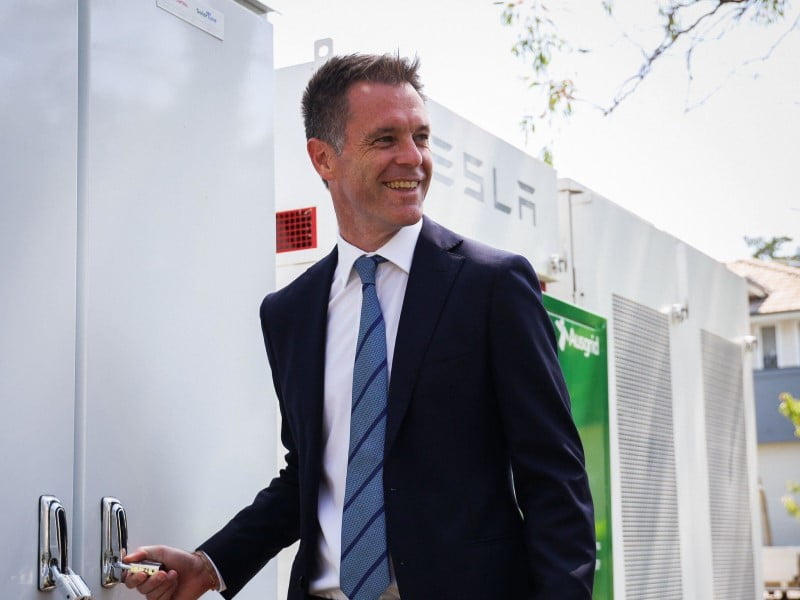NSW Labor will create a $1 billion state-owned Energy Security Corporation modelled on the federal Clean Energy Finance Corporation if it is elected next month.
Announced on Sunday, the investment corporation will partner with industry to focus on the rollout of community batteries and other medium to long duration energy storage solutions. These may include pumped hydro or “other commercially viable technologies able to provide grid stability”, according to a statement.
It rivals the $300 million election commitment by the incumbent Coalition state government on Saturday to fund “renewable energy storage and grid security projects, such as pumped hydro and batteries”.
The Coalition announcement is a part of the wider $1.5 billion Clean Energy Superpower Fund, which also includes the $1.2 billion Transmission Acceleration Fund introduced in the 2022-23 state budget.

The Energy Security Corporation proposed by NSW Labor would be seeded through the Restart NSW Fund, which was established in 2011 through Infrastructure NSW and must commit 30 per cent of all investments to projects in regional NSW.
NSW Labor is also seeking to legislate its emissions reduction targets of a 50 per cent reduction on 2005 levels by 2030, and net-zero by 2050. A Net Zero Commission will be established to “monitor and review our progress, its impacts on jobs and industry, as well as energy prices”.
The commitments are a part of NSW Labor’s broader Fresh Start election platform to “safeguard state owned assets from further privatisation”. This will include legislation to prevent the privatisation of services such as Sydney Water, Sydney Trains, and Ausgrid, among others.
NSW Labor leader Chris Minns said the body’s investment in community batteries would help lower electricity bills and secure the state’s energy transition away from fossil fuels.
“The state is facing big challenges as we manage our energy transition over the next decade. We want the state to be able to invest in solutions that ensures reliability in the system, keeps the lights on and creates new jobs for the state,” Mr Minns aid.
“Privatisation does not work. It has been a disaster for New South Wales and under Labor it stops. This is not a band aid solution. Whilst it will take time for the benefits to be realised, this is a serious, long-term step towards fixing the mess left by the Liberal National government.”
NSW Shadow Treasurer Daniel Mookhey said the proceeds from the state-owned investment corporation would “deliver a fairer, more reliable energy system”.
Around 53 per cent of the state’s total energy generation comes from renewable energy, however just under 27 per cent of households in New South Wales have solar panels, the lowest of all the states. Of solar equipped households, one in 60 have battery storage.
The Commonwealth’s Clean Energy Finance Corporation will be used as a model. It invests in low emissions technologies through loans, equity, investment funds, asset finance, and debt markets. It is prohibited from investing in technology for carbon capture and storage, nuclear technology and nuclear power.
A benchmark rate of return for the CEFC’s core investments is legislated at Australia’s five-year Australian government bond rate plus three to four per cent. Management of the fund is overseen by the CEFC board, which is appointed by the federal Energy minister and the Finance minister.
Legislation for the establishment of a CEFC-based National Reconstruction Fund corporation, which is currently expected to invest $15 billion, is currently before the Commonwealth parliament.
Responding to the news in a statement, Clean Energy Council chief executive Kane Thornton said that by focusing on “reliability, affordability, and medium- to long-term storage, the public-sector contributions by the NSW Energy Security Corporation will help lower power prices, create jobs, keep the lights on and reduce our emissions”.
Mr Thornton said there is an “enormous private sector appetite for clean energy”.
“We are in a global clean energy arms race. The world has changed markedly in just six months, global competition for green finance, equipment and human capital is intensifying, and we will need to boldly assert ourselves to secure a share of this massive green growth opportunity,” he said.
The Victorian Labor government has begun re-establishing a state-owned energy generation company following a successful election last November.
Do you know more? Contact James Riley via Email.

